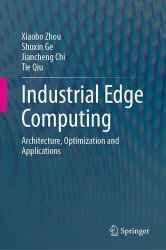Industrial Edge Computing: Architecture, Optimization and Applications
- Добавил: literator
- Дата: 25-08-2024, 03:39
- Комментариев: 0
 Название: Industrial Edge Computing: Architecture, Optimization and Applications
Название: Industrial Edge Computing: Architecture, Optimization and ApplicationsАвтор: Xiaobo Zhou, Shuxin Ge, Jiancheng Chi, Tie Qiu
Издательство: Springer
Год: 2024
Страниц: 216
Язык: английский
Формат: pdf (true), epub
Размер: 42.3 MB
This book serves as a pivotal guide for professionals and researchers within the industrial computing domain, offering an extensive examination of edge computing in industrial environments. Tailored for individuals possessing a foundational understanding of industrial computing systems, it aims to augment their knowledge concerning the role and capabilities of edge computing in this dynamically evolving sector.
In an era where real-time, reliable, and scalable computing solutions are of paramount importance, traditional cloud computing models grapple with challenges such as latency, bandwidth limitations, data sovereignty, and privacy concerns. This book positions edge computing as a crucial evolution in industrial data processing and analytics, specifically addressing these challenges. It introduces a distinctive three-layer industrial edge computing architecture that integrates device, edge, and application layers, explicitly designed to accommodate the intricacies of the Industrial Internet of Things (IIoT).
Beyond elucidating the theoretical foundations of edge computing, the book delves into its practical applications, with a particular emphasize on edge-assisted model inference as a key scenario. It offers insightful case studies and discussions on the integration of edge computing with Artificial Intelligence (AI), illustrating how this collaboration is revolutionizing industrial systems. A comprehensive understanding of the material is facilitated by a background in Computer Science, industrial engineering, IoT, and cloud computing.
Industrial edge computing refers to the practice of managing data-handling activities using individual sources of data capture or storage, such as smart edge devices or equipment. This allows capturing, analyzing, or accessing data without accessing a centralized network segment or the cloud. Industrial edge computing provides a more efficient and effective way of processing data in real-time, leading to faster decision-making, improved operational efficiency, and reduced costs in various industrial sectors. The adoption of industrial edge computing is accelerated, especially in industrial applications like autonomous driving, smart manufacturing, and predictive maintenance. These applications usually have stringent requirements in terms of quality of service (QoS), reliability, scalability, and deployability. To address the complex industrial demands and challenges, the comprehensive theory on industrial edge computing, including network architecture, protocols, and algorithms, has to be established and tailored for industrial environments.
In this book, we explored and designed specific solutions for different applications based on latency minimization schemes, energy consumption trimming, and accelerating inference with improved model accuracy. It covers the following topics:
• Computation Offloading in Industrial Edge Computing: Emphasizing the need for adaptive matching of computational tasks to the most appropriate processing units, computation offloading involves a careful assessment of both task requirements, task dependency, and resource availability. The goal is to orchestrate computational tasks in a way that is not only highly effective but also efficient in terms of resource utilization.
• Data Caching in Industrial Edge Computing: Utilizing the Age of Information (AoI) to assess the freshness of cached data, and Field-of-View (FoV) to estimate the Quality of Experience (QoE), we have developed multi-agent-based algorithms for decision-making. These algorithms aim to minimize download latency and enhance QoE. This approach ensures that the data is both current and optimized for user experience, leveraging the collective intelligence of multiple agents for more efficient and effective decision-making.
• Service Migration in Industrial Edge Computing: Considering the interference among devices and privacy concerns arising from user mobility, we have developed service migration strategies based on Lyapunov optimization and reinforcement learning. These strategies are aimed at minimizing the total energy consumption, response latency, and risk of privacy leakage.
Besides, we further explore the application of industrial edge computing in image-oriented object detection, point cloud-oriented object detection, and video inference with knowledge distillation to demonstrate its advantages. Overall, this book offers a detailed and structured insight into industrial edge computing. It thoroughly examines various research achievements in this area, including its architecture, developments, challenges, and applications. The goal is to clarify the relationship between Industrial Internet of Things (IIoT) and edge computing and to encourage their ongoing growth and integration. The book is a valuable resource for researchers, designers, and newcomers in industrial edge computing. It intends to significantly enhance the understanding and progress of this emerging field.
Contents:
Скачать Industrial Edge Computing: Architecture, Optimization and Applications
[related-news] [/related-news]
Внимание
Уважаемый посетитель, Вы зашли на сайт как незарегистрированный пользователь.
Мы рекомендуем Вам зарегистрироваться либо войти на сайт под своим именем.
Уважаемый посетитель, Вы зашли на сайт как незарегистрированный пользователь.
Мы рекомендуем Вам зарегистрироваться либо войти на сайт под своим именем.

